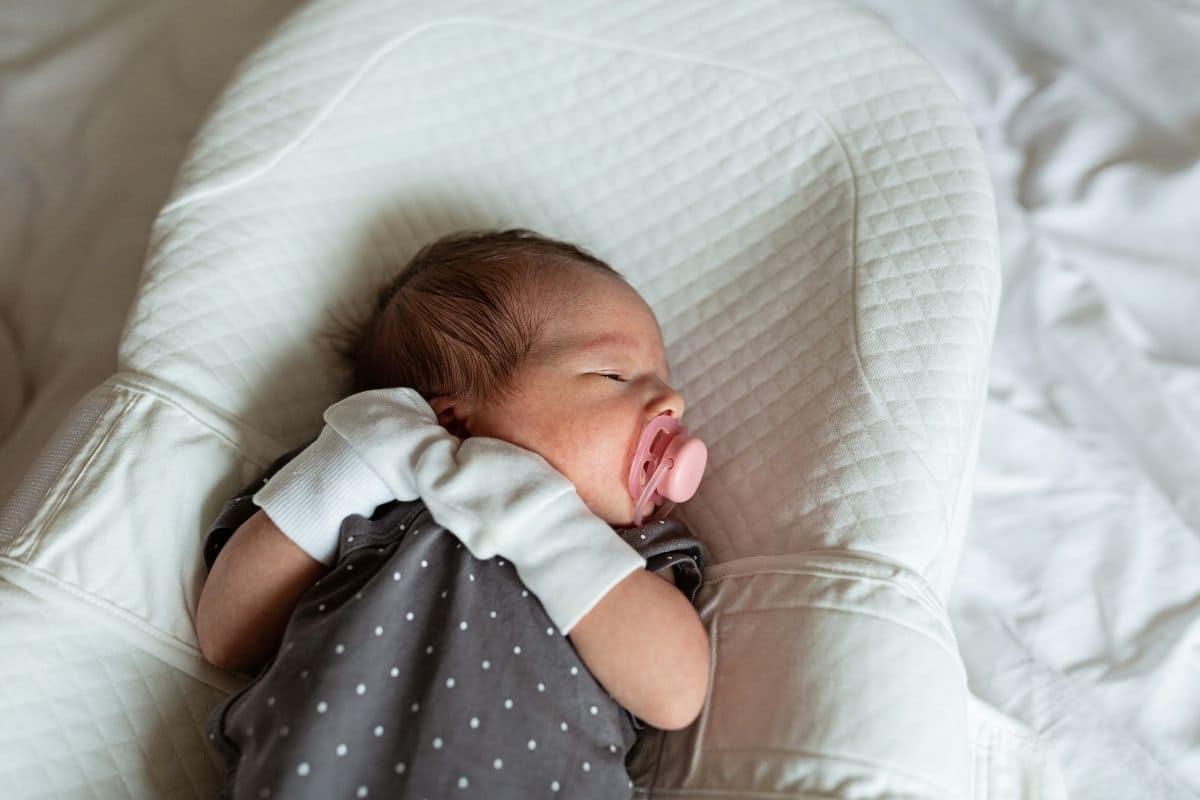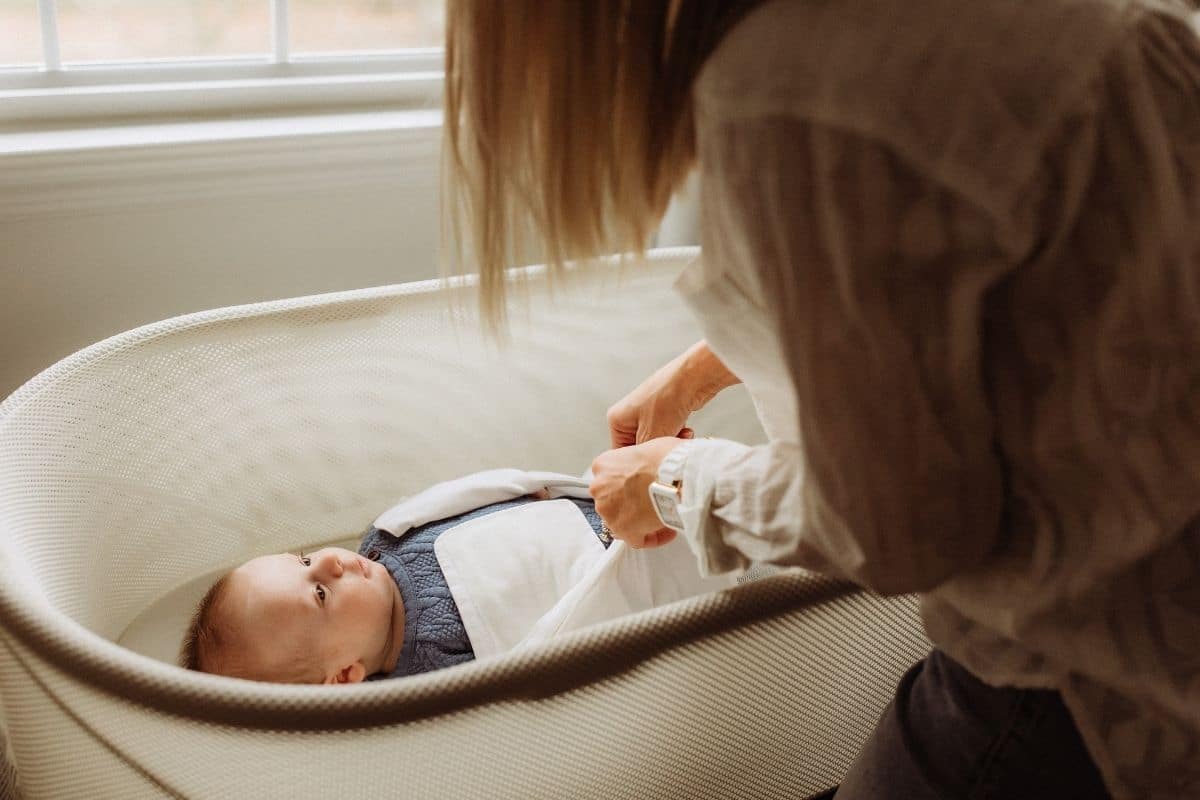Newborn babies are cute, but they also require a lot of attention – as well as plenty of sleep!

Getting your newborn to sleep in a bassinet is an important part of ensuring that they receive the sleep that they need – but babies are not always cooperative.
Fortunately, we can help – read on to discover our top tips to get your baby to sleep in a bassinet safely and effectively.
How Much Sleep Does My Newborn Need?
The amount of sleep each infant needs varies depending on many factors, including age, weight, gender, and medical condition.
The American Academy of Pediatrics recommends that infants should be put to bed between 7 pm and 8 pm, and awake between 5 am and 6 am.
The average newborn sleeps 12 hours per day, although some babies only need 10 hours of sleep per day.
Most babies start sleeping through the night within 2 weeks of birth, but some take longer than others.
When Should I Start Putting My Baby Down For Nap Time?
It’s recommended that you put your baby down for nap time when she/he is sleepy, not hungry.
If your baby wakes during the night, try putting her/him back to sleep right away. You don’t want your baby to have any interruptions in her/his sleep cycle.
Why Is Sleep So Important For Babies?

Sleep is essential for the health and well-being of humans – and this is particularly important for babies.
Sleep helps to regulate hormones, brain development, muscle growth, bone formation, and immune system function. Lack of proper sleep causes fatigue, irritability, poor concentration, and mood swings.
Some of the benefits of sleep for babies include:
Improves Brain Function
Your baby’s brain develops rapidly after birth and continues growing throughout childhood.
During sleep, the brain consolidates memories and processes information. When your baby isn’t getting enough sleep, he/she may experience problems with memory and learning.
Helps With Digestion And Elimination
Your baby’s digestive tract also grows quickly after birth and requires regular rest to keep functioning properly. Poor digestion can lead to constipation, diarrhea, gas, and stomach aches.
In addition, getting enough sleep could help to keep your child at a healthy weight – in many cases, a lack of sleep has been linked to obesity in adults.
Studies show that obese kids are less likely to get enough sleep than their normal weight peers.
Promotes Healthy Weight Gain
When your baby is tired, he/she will naturally eat less food – and therefore gain less weight.
Prevents Sudden Infant Death Syndrome (SIDS)
Newborns who aren’t sleeping well are more likely to die from SIDS.
A study published in the Journal of Pediatrics found that children who slept less than 9 hours per 24-hour period were three times as likely to die from SIDS.
Protects Against Asthma And Other Respiratory Problems
Children who don’t get enough sleep are at an increased risk of developing asthma and other respiratory conditions.
Research shows that insufficient sleep increases airway inflammation and makes it harder for a child to breathe.
Reduces The Chance Of Learning Disabilities
Children who do not receive sufficient sleep are at greater risk of having learning disabilities.
Studies suggest that lack of sleep affects the way the brain functions, which leads to problems with attention and focus.
Enhances Immune System Function
Getting adequate sleep boosts your body’s ability to fight off infections and illnesses.
It also improves the effectiveness of white blood cells, which help protect against disease, and can help your baby to recover from childhood illnesses and infections more easily.
Studies show that getting enough sleep also reduces the risk of heart disease or developing other chronic conditions throughout our lives.
Relieves Stress And Anxiety
Getting enough sleep reduces stress and anxiety levels.
Research suggests that people who sleep longer and better feel happier and calmer – and this can start right back in the newborn stage.
Babies who are well rested are much less likely to be grizzly, anxious, or suffer other mood problems.
Boosts Mood And Self Esteem
Studies show that teenagers who get fewer than seven hours of sleep each night have lower self-esteem and higher rates of depression.
Children who don’t get enough shut-eye often struggle with schoolwork, making friends, and socializing.
They’re also more likely to engage in risky behaviors such as drinking alcohol or smoking cigarettes.
While some of these benefits may not become apparent until your child is older, it seems clear that establishing healthy sleep patterns and habits from birth can have tremendous advantages later in life.
Sleep And The Fourth Trimester
The fourth trimester is an important stage in child development and one which can have a significant impact on sleep quality and quantity.
The fourth trimester is a developmental phase that occurs after birth and is characterized by rapid growth and changes in brain function.
During this time, babies undergo physical and cognitive changes and become increasingly aware of their surroundings.
These changes can result in increased activity levels, as well as a desire to explore and learn new things.
During this period, babies also develop a strong bond with their mother and begin to rely on her for emotional support.
This can sometimes lead to separation anxiety, and difficulty settling in at night.
In addition to these physiological changes, babies are also developing social skills and becoming more independent.
They are learning how to communicate with others, and are starting to understand what other people want and need. As such, this can affect their ability to relax and get comfortable at night.
The Benefits Of Putting Your Baby To Sleep In A Bassinet

There are many benefits to putting your baby to sleep in the bassinet including:
Comfort
Babies will feel more secure and comfortable sleeping in their own space – a bassinet will ensure that your little one has plenty of room to move, roll, wriggle and kick, and this can help reduce the chances of them waking themselves up in the night.
The bassinet will give them a sense of security and comfort, which will help them settle better at bedtime.
Easier Access
A bassinet will make it easier for you to feed them during the night – you can simply lift them gently for a feed, and then place them back into the bassinet when you are both done.
Safety
With a bassinet, you won’t have to worry about accidentally rolling over or bumping into them during the night – this is often a concern that many parents have when co-sleeping or sharing a sleeping space.
You can also put them down without worrying about falling over, and there is less risk of injury from tripping or stumbling over them while walking around the house.
Having a safe and comfy sleeping environment will encourage them to fall asleep quickly and easily, and will prevent them from waking up during the night.
Why Won’t My Newborn Sleep In A Bassinet?
Sometimes, your newborn may appear reluctant to settle and sleep in a bassinet, despite your very best efforts. Some common reasons for this may include:
Your Baby Is Not Used To Sleeping On His Back
Newborn babies usually prefer to lie on their backs, which is why most parents choose to place them in a crib.
However, if your baby appears uncomfortable or distressed when placed on his/her back, try switching to a side-lying position instead.
Your Baby Has Been Woken Up Too Early
Newborn babies are often woken up from their slumber by busy environments such as bright lights, loud noises, or sudden movements.
These disturbances can cause them to become agitated, and wake up feeling unwell. It’s important to ensure that your baby stays well-rested, and doesn’t get overtired.
Your Child May Be Suffering From Reflux Or Gastroesophageal Reflux Disease (GERD)
Reflux disease occurs when acid refluxes into the esophagus, causing discomfort and distress. While GERD is quite rare in newborns, it does occur in some cases.
If your child displays symptoms of GERD, including frequent spitting up, vomiting, or a sore throat, consult with your pediatrician immediately.
Bassinet Safety Tips For Parents
It’s essential that you take precautions to keep yourself and your baby safe when using a bassinet. Always follow these safety guidelines:
- Don’t leave your child unattended in the bassinet. Make sure that there are no loose cords or blankets that could be pulled by curious hands.
- Never use a bassinet with any kind of cover – this may restrict access to the baby, and could potentially cause suffocation.
- If you’re planning to use a mattress or pillow, make sure that they are firm enough to support your baby’s head. Never change the bassinet mattress supplied with the bassinet.
- Check that the bassinet has a sturdy base so that it doesn’t tip over.
- Ensure that the bassinet is placed in a quiet area where there aren’t lots of distractions.
- Keep the bassinet away from windows and doors to avoid draughts.
- Avoid placing the bassinet near heating vents or air conditioning units. This could increase the risk of overheating or cold drafts.
- Make sure that the bassinet isn’t too hot or too cold.
- Don’t forget to check that the bassinet meets all relevant safety standards before you buy it.
How To Get Your Baby To Sleep

To help ensure that you and your newborn enjoy some good quality restful sleep throughout this challenging stage, try following these tips:
Make Your Baby As Comfortable As Possible
It doesn’t matter if you are breastfeeding or bottle-feeding your baby; make sure they are comfortable and cozy before putting them down for the night.
You want to avoid waking up every time your baby cries because they are uncomfortable.
Create A Calm, Soothing Environment
Try to keep noise levels low when you put your baby to bed. Turn off all lights and electronics so there is nothing else competing with their sleep.
Also, try to create a calm environment by dimming the lights, playing soft music, and using aromatherapy oils.
Lighting also matters – if you’re having trouble getting your baby to settle down at night, consider investing in a dimmer switch.
Dimming lighting can help reduce the amount of light entering the room, and encourage drowsiness. Try keeping noise levels low to minimize disturbance during the night.
You might find that investing in a white noise machine works best for this purpose and really helps your little one to drop off quickly.
Temperature
Make sure that your baby’s room is warm enough to keep them cozy, but not too hot. Ideally, it should be between 20°C and 24°C (68°F and 75°F).
Bedroom Set-up
If possible, set aside a separate space within the bedroom for your baby to sleep. It should ideally be free of clutter, and provide a calm and relaxing atmosphere.
Clothing
It may seem counterintuitive, but dressing your baby in loose clothing rather than tight ones can actually help them feel more relaxed and comfortable when sleeping.
However, make sure that the clothes aren’t too loose as you don’t want your little one to get entangled.
Feeding
Try feeding your baby just before bedtime to promote relaxation. When breastfeeding, make sure that you breastfeed your baby right up until she falls asleep.
This will help to prevent hunger pangs from waking her up later on.
Toys
Keep toys out of reach of your baby so they don’t disturb their sleep.
Crib Mattress
Ensure that your baby sleeps comfortably on a firm mattress. Although it may not seem very comfortable to many of us, a firm mattress is the perfect resting place for a baby.
Sleeping Position
Your baby will naturally fall asleep while lying down. However, if he/she becomes restless, try changing positions every hour or two. Try placing him/her on his back first, then side-lying, and finally tummy-down.
Try Baby Massage And Exercise
Massaging your baby’s limbs and body can help to relieve stress and tension, and encourages deep breathing.
Keep To A Regular Bedtime Routine
As much as possible, stick to a regular routine when it comes to nap times and bedtimes. This will help to establish a pattern and give your baby time to adjust to new routines.
If possible, try to go to bed earlier so your baby has more uninterrupted sleep, especially when you are sleeping in the same room.
This will allow them to fall asleep faster and stay asleep longer. Try to limit naps during the day so you can give your baby more uninterrupted sleep during the night.
What Is A Good Bedtime Routine For Babies?
As we have mentioned, establishing a good bedtime routine can be the key to helping your baby drift off.
If you have no idea where to start, here are a few suggestions for establishing a good bedtime routine for your little one.
Give Them A Warm Bath Before Going To Bed
It’s important to give your baby a warm bath before going to bed so they can relax and fall asleep faster. You should use lukewarm water – always test this first.
Make sure you turn on the faucet slowly and let the water run until it feels just right. Once done, gently pat your baby dry with a soft towel.
Dress Them In Comfortable Clothes
Once you have bathed your baby, get them dressed in warm, comfortable, loose clothing which is designed for sleep.
Avoid tight-fitting clothes, and make sure they aren’t wearing any shoes that could cause discomfort while sleeping.
Take Your Baby Into Their Calm, Dark Room
Take your baby into their room before bedtime so they can settle down and prepare themselves mentally for sleep.
This will prevent them from waking up during the night and disturbing their parents.
Music has been proven to help babies sleep. Try playing soothing music (such as classical) softly in the background while you put your baby to bed.
Lay Your Baby Down While Speaking Gently
When laying your baby down, try speaking softly to them and stroking their hair. Do this as you lay them down so they know it’s time to go to sleep.
Remain Consistent
It is important to repeat this bedtime routine each night, to help your baby settle more quickly. Once you’ve established a good bedtime routine, stick to it every night.
Final Thoughts
Getting your newborn to sleep in a bassinet may feel challenging at times, but if you follow our tips above, you’ll find it easier than ever, and this will result in a mother and baby who are both calm, well-rested, and healthy – and who can ask for more than that?

Carly Link, a 33-year old mother of two toddlers. She is a parent and goes through a lot of the usual parenting difficulties herself. Carly shares all her experiences and knowledge about the best baby products through this blog.








